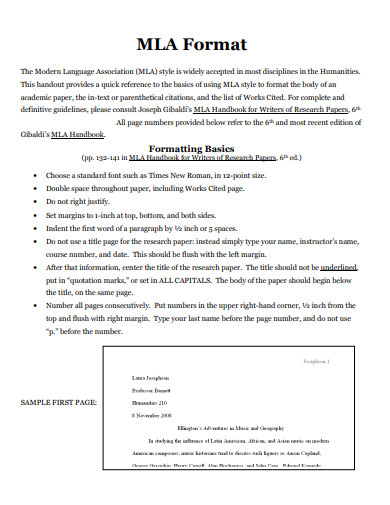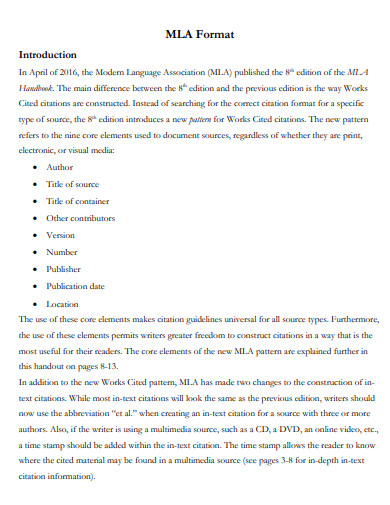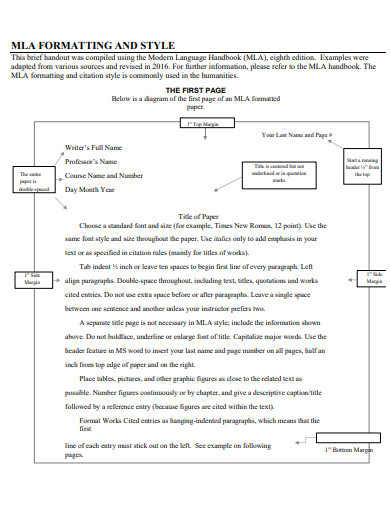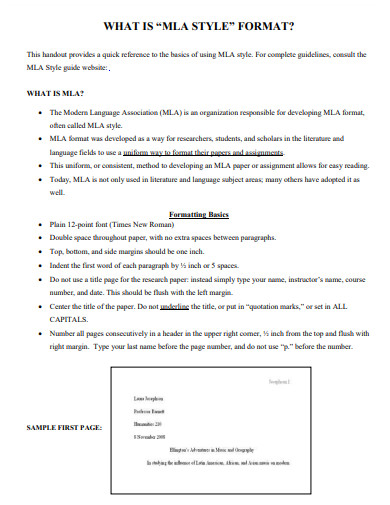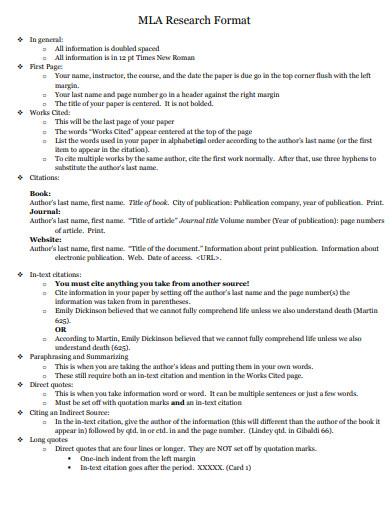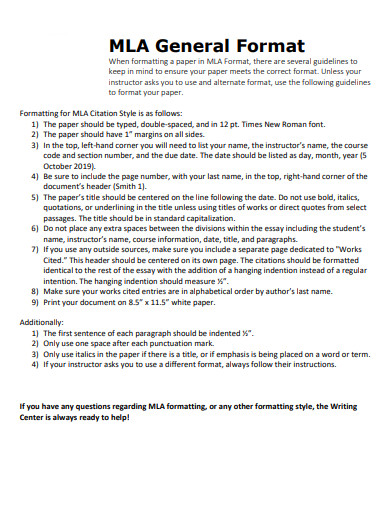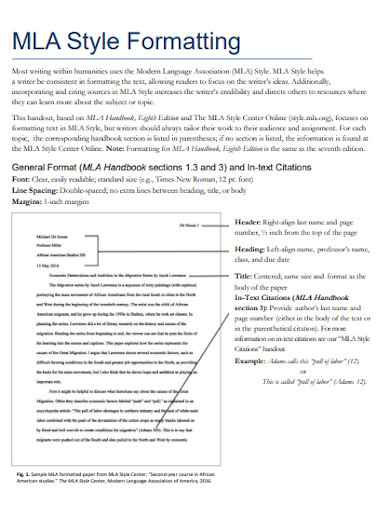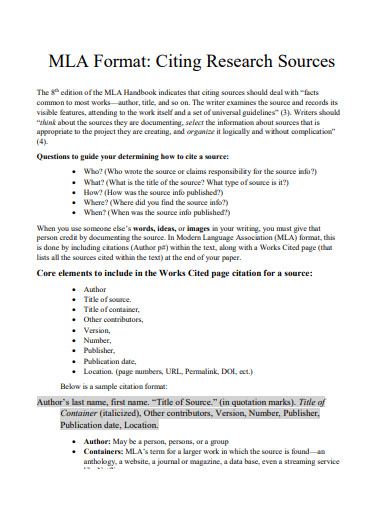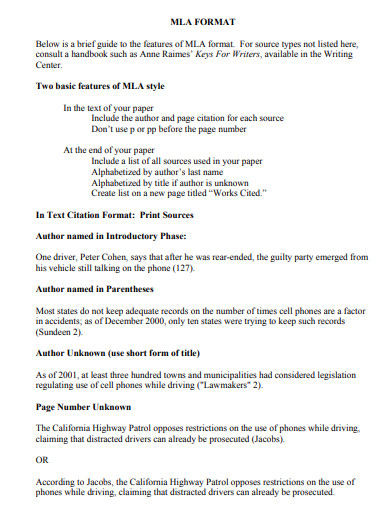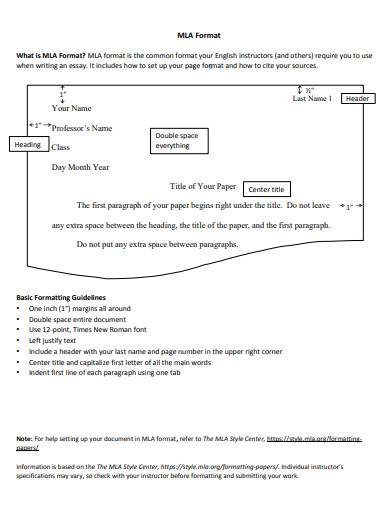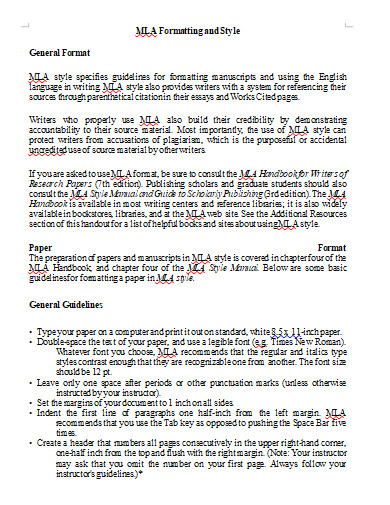By displaying responsibility to their source material, writers who utilize MLA correctly improve their credibility. Most crucially, using MLA style helps safeguard writers from charges of plagiarism, which is the intentional or unintentional copying of other writers’ source material without attribution. If you’re asked to utilize MLA format, make sure you read the MLA Handbook first (9th edition). The MLA Style Manual and Guide to Scholarly Publishing are both useful resources for producing scholars and graduate students (3rd edition). Most writing institutes and reference libraries have copies of the MLA Handbook. It can also be found in bookstores, libraries, and on the MLA website.
10+ MLA Format Samples
The Modern Language Association (MLA) is the body in charge of MLA format development. It was created to help researchers, students, and academics in the literature and language disciplines format their papers and assignments in a consistent manner. This strategy of producing a paper or assignment in a regular, or consistent, manner enables for easy reading. MLA is now widely utilized in fields outside than literature and language; many others have embraced it as well. In April 2021, the Modern Language Association published the 9th and most recent edition of its MLA Handbook. The Handbook includes detailed citation instructions as well as submission procedures that follow the Modern Language Association’s rules and standards.
1. MLA Format
2. Sample MLA Format
3. MLA Formatting and Style
4. MLA Format Cheat Sheet
5. MLA Research Format
6. MLA General Format
7. Sample MLA Formatting and Style
8. Basic MLA Format
9. Formal MLA Format
10. Professional MLA Format
11. Printable MLA Format
General Paper Formatting
Paper choice
While many professors, instructors, and periodicals accept electronic submissions, some prefer to have their papers printed. The type of paper to use for printed submissions is discussed in this section. Use only white paper if you desire to print your document. To print your product, choose a regular, high-quality paper. Avoid using cardstock. The use of resumé paper is not required. Use regular printer or copy paper of good quality. When it comes to paper size, 8 12 by 11 inches is ideal. Before submitting, ask your teacher whether you can use a various sizes.
Use 1-inch margin
Utilize margins all the way around the page. In the one-inch margin, the running head should be the only thing visible. The standard margin size in most word processors is one inch. To get the margin size, go to the program’s page settings option.
Indenting paragraphs
Every paragraph’s initial word should be indented. Beginning sentences one half inch from the left edge is recommended. It is not essential to measure half an inch by hand. To make a half-inch spacing, press the “tab” key on your keyboard.
Double space paragraphs
The MLA research paper structure demands double-spaced lines throughout the whole research paper or MLA format essay. Between the textual body of the work, in the title, and on the MLA reference page, double-spaced lines should be located. Although it may be enticing to add a few more lines between the heading, title, and the start of the paper, all lines should be double spaced.
Font and font size
It is permitted to use any easy-to-read font type in an MLA paper. Many reference categories, such as books and articles, employ easy-to-read typefaces, so if you’re looking for inspiration, look to other sources for ideas. Arial and Times New Roman are two of the most prominent used fonts. It is critical for the reader to be able to discern between italics and regular fonts, so if you use a font style other than Arial or Times New Roman, ensure the comparison between the two is clear. It is advised that you select a 12-point font size because this is the standard size for many word processing systems.
Binding
Some lecturers or instructors will advise you on how to obtain hard copies of your projects. A simple pin in the top left corner should sufficient if your professor does not include any requirements or assistance. Some professors allow paper or binder clips if a stapler is not supplied. To keep the pages intact, do not flip the top left corner down. The page might easily unfold, resulting in a paper mess. Binders and plastic holders may be nice, but they add bulk to a professor or teacher who may want to take the papers home for grading. Maintain a basic and neat binding. The best choice is to use staples, followed by a binder and paper clips.
FAQs
What are the considerations when creating a title page?
Make a title page for your paper only if it is particularly requested or if it is a collective project. If you’re working on a group project, mention all of the contributors’ names in the header, giving each one its own line, then follow the remaining MLA header criteria as outlined below. Format the rest of the page according to the instructor’s instructions.
What are section headings for?
Section headings are occasionally used by writers to increase the readability of a manuscript. Individual chapters or other identified elements of a book or essay may be included in these sections.
If you want to see more samples and formats, check out some MLA format samples and templates provided in the article for your reference.
Related Posts
FREE 10+ Informative Speech Thesis Statement Samples [ Paper ...
FREE 10+ Academic Project Proposal Samples [ Outline, Research ...
FREE 10+ Outline Essay Samples in MS Word - Sample Templates
FREE 36+ Complaint Letter Samples in MS Word Pages | Google ...
FREE 10+ Research Paper Essay Samples in MS Word Google ...
FREE 10+ Editor Job Description Samples in MS Word PDF
FREE 8+ Sample Speech Outline Templates in PDF MS Word
FREE 8+ Sample Cover Page Templates in PDF MS Word
FREE 7+ Amazing Training Outline Templates in PDF MS Word
FREE 8+ Sample Research Paper Outline Templates in PDF
FREE 34 Research Papers in PDF
FREE 10+ Informative Thesis Statement Samples [ Speech, Paper ...
FREE 10+ Research Paper Essay Samples in MS Word Google ...
FREE How Do You Write a College Research Paper? [ Guidelines ...
FREE 10+ Informative Thesis Statement Samples [ Speech, Paper ...

